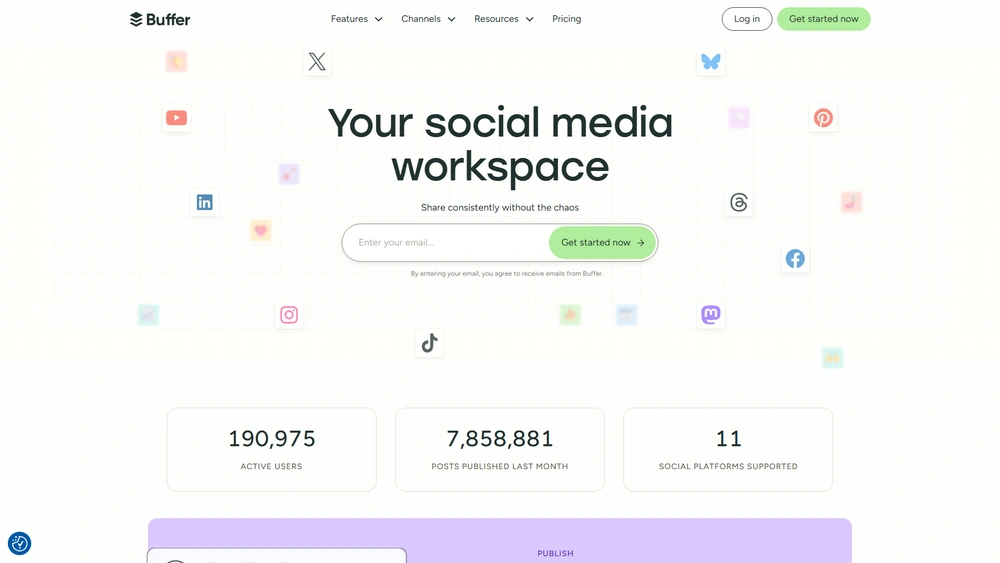Buffer Overview & 2026 Industry Position
Buffer has long been a go-to platform for streamlining social media publishing. In 2026, it’s cementing its relevance by evolving into an intelligent content hub, integrating AI scheduling, performance analytics, and team collaboration. Amidst rising demand for authentic cross-platform engagement, Buffer continues to lead with simplicity, transparency, and sustainable design.
From Launch to 2026 Journey
Founded in 2010 as a simple Twitter scheduling tool, Buffer quickly expanded across major social platforms. Over the years, the platform introduced robust analytics (2013), browser extensions (2015), and Pablo image creator (2016). In 2019, it gained traction as a full-circle social media manager. The 2023 introduction of AI-assisted timing and its 2024 audience-building tools paved the way for its 2025 focus: empowering growing brands with efficiency-focused, human-centric automation.

Buffer Key Features
Buffer offers a feature suite tailored for individuals, SMBs, and marketing teams focused on scalable, authentic audience engagement.
- Multi-platform social scheduling (X, Instagram, LinkedIn, TikTok, Pinterest, Facebook)
- AI-driven best-time publishing suggestions
- Customized link-in-bio landing pages
- Team collaboration workflow (approvals, comments)
- Canva and Unsplash integrations for content creation
- Tagging, campaign analytics, and performance dashboards
- Mobile app (iOS/Android) with full scheduling access
Workflow & UX Highlights
Buffer is widely recognized for its clean, intuitive interface. Timeline-scheduling is visually friendly and drag-and-drop enabled. The calendar view offers quick post adjustments. Simplicity is prioritized across mobile and desktop, with onboarding tooltips and templates available for beginners. In 2026, AI tools now recommend content slots and even detect brand tone inconsistencies.
Buffer Pricing Analysis & Value Metrics
As of July 2026, Buffer offers four main pricing tiers, each designed to meet varying team needs:
| Plan | Price (monthly) | Accounts | Users | Notable Features |
|---|---|---|---|---|
| Free | $0 | 3 | 1 | 10 scheduled posts, link-in-bio |
| Essentials | $6/month per channel | Unlimited | 1 | Unlimited scheduling, analytics, AI toolset |
| Team | $12/month per channel | Unlimited | Up to 10 | Team collaboration, approval workflow |
| Agency | Custom, starts ~$100/month | 50+ | Unlimited | Bulk scheduling, white-label reports |
Value Assessment: Highly cost-effective for startups and solo marketers. The per-channel pricing model can add up for agencies, but delivers strong ROI per feature density.
Competitive Landscape
| Platform | Strength | Best for… |
|---|---|---|
| Buffer | Ease, built-in AI, clean UX | Indie creators, SMBs, lean teams |
| Hootsuite | Enterprise-scale dashboards | Mid–large agencies |
| Later | Visual Instagram-first tools | Influencers, e-commerce |
| Zoho Social | CRM integration | Zoho Suite users |
Use Cases & Scenarios
- Solo entrepreneurs building brand awareness
- Agencies managing 20–100+ client accounts
- Bloggers and podcasters scheduling promotions
- Creative teams coordinating visuals and captions
- Startups optimizing post timing via predictive AI
Integrations & Ecosystem
Buffer integrates with a thoughtful suite of tools:
- Canva, Unsplash (visuals)
- Zapier (automation chains)
- Shopify, WooCommerce, Gumroad (commerce)
- LinkedIn Pages, TikTok scheduling, Instagram Reels/Stories
These integrations enable seamless workflow across content creation, publishing, and analytics—especially vital in remote, multi-tool teams.
Pros & Cons
- ✔ Pros: Clean UX across devices, helpful AI tools, transparent pricing, generous free tier.
- ✖ Cons: Per-channel pricing adds up at scale, limited advanced CRM/social listening integrations.
Final Thoughts: Who Buffer Fits Best
Buffer is an optimal fit for creators, solo brands, and lean teams seeking intuitive social media publishing and automation. It’s not built for enterprise-scale needs but shines in simplicity, transparency, and empowering growth at every tier.
Buffer FAQ
Yes, Buffer supports TikTok and Instagram, including support for Reels and Stories with scheduling tools.
Yes, the Team and Agency plans include multi-user collaboration, approvals, and comments across scheduled content.
Pricing is per social channel per month. Each tier allows unlimited scheduling, with higher plans unlocking collaboration tools.
Yes, Buffer’s free plan supports up to 3 channels with 10 scheduled posts per channel and a link-in-bio page.
Buffer provides post-performance metrics, engagement charts, and audience growth analytics across platforms depending on your plan.

